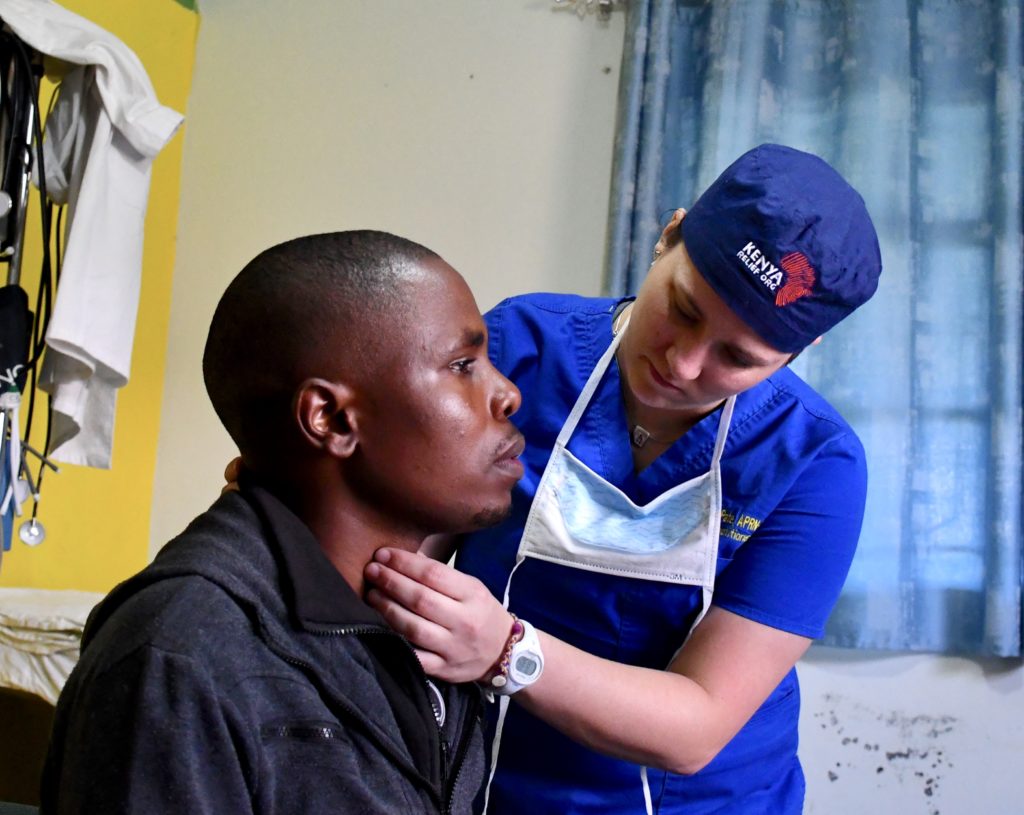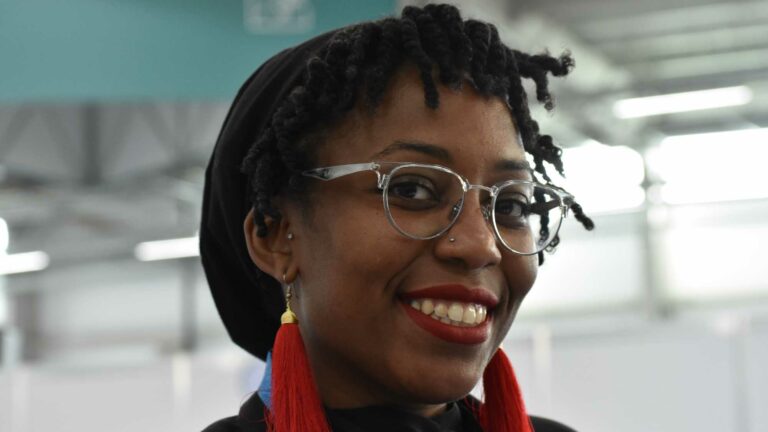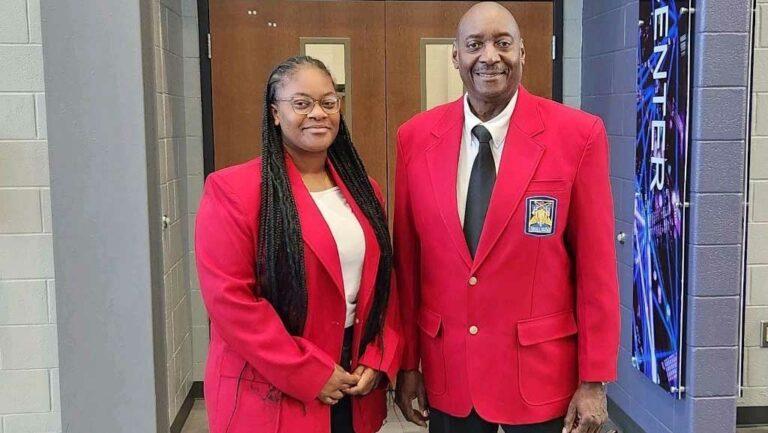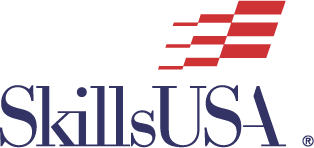One thing you can’t say about former SkillsUSA national officer Brice Harader-Pate is that she lets the grass grow under her feet. She’s always looking for new opportunities, consistently choosing to make every moment count. Harader-Pate credits a now 10-year involvement with SkillsUSA for honing her leadership and employability skills while inspiring her to become a nurse practitioner and medical missionary to the poorest of the world’s poor. In both roles, she’s truly making a world of difference, just as SkillsUSA did in her own life. “The employability and leadership skills — and just the motivation and the confidence you get from involvement with SkillsUSA — is amazing,” she says. “It helped me to have a feeling of worth. It is where I started.”
Harader-Pate was raised in Arkansas City, Kan., a city with a rural population of 12,000. As a young student, her family’s income didn’t allow for extracurricular activities, so joining SkillsUSA — a co-curricular activity where chapters conducted their own fundraising — was an easy decision. Harader-Pate made that decision in her junior year at Arkansas City High School in 2002. There, she joined a health sciences class, where advisor Deb Hargrove encouraged her to compete.

The competitive component of SkillsUSA quickly connected with Harader-Pate, evidenced by the gold medals she won in both Extemporaneous Speaking and First Aid/CPR at the SkillsUSA Kansas state championships during her first year. From there, it was on to the national level, but she could only compete in one of the two competitions in which she’d just earned state gold. Fatefully, she chose First Aid/CPR, placing fourth (just a tenth of a point from a bronze medal).
Still, the accomplishment combined with the overall experience of the national conference inspired Harader-Pate to shift her focus to the leadership component of SkillsUSA. She became a state officer during her senior year in high school, and then, in 2004, was elected as the national college/postsecondary parliamentarian.
From there, Harader-Pate’s path toward service through the medical profession began to make itself clear. She earned a bachelor’s degree in nursing and a master’s degree as a nurse practitioner from the University of Oklahoma. She’s received a certification in emergency and critical care from Vanderbilt University, and she’s currently enrolled in a three-year doctorate of nursing practice program back at the University of Oklahoma.
Service with gratitude
Harader-Pate says her drive to excel is rooted in the lessons learned through her SkillsUSA involvement, but those roots are also found in her desire to prove her worthiness of the help she’s received along the way. “I am the first person in my family to attend college,” she explains, “and I made it a point to excel. My family sacrificed a lot to see that I had an education. My grandparents even paid my rent and expenses as I attended college. I try to make it a point to prove their confidence in me was founded and my desire to return to school was not wasted.”
That point has been made many times over through Harader-Pate’s medical mission work, something she became involved with as a student at the University of Oklahoma. The university operates the Christian Medical and Dental Association, working with United Servants Abroad to send teams to Peru annually. In 2014, Harader-Pate and four other nurse practitioner students made that trip; for Harader-Pate, it was the start of a new passion.
“After going on my first medical mission trip, I realized that many other countries don’t have what we have,” she says, still amazed by the differences in cultures. “Here, we can walk into any hospital emergency room to get care. There, people must pay ahead for any surgery. Patients are given a list of all the supplies for their surgery, and they must buy everything and then pay for the doctor and the services. You have to be wealthy to get your appendix out or have an emergency C-section.”
Understanding the desperate need for her skills among the world’s poorest populations inspired Harader-Pate to do even more. “Seeing the deep poverty yet witnessing the pure joy of the local community receiving your care and words of comfort was so inspiring,” she says. “Once you experience this type of poverty, lack of access and affordability of medical care throughout the world, you cannot not go back.”

Harader-Pate didn’t just “go back,” she went to new places in need. In 2018, she began her work in Africa with the Kenya Relief organization, taking part in three medical missions to Africa that year alone. To date, Harader-Pate has completed seven international missions, sometimes providing medical care for up to 200 patients in one day. Many of the sickest patients waited in line overnight outside of the clinics with no food or water.
Among this poverty and lack of opportunity, Harader-Pate realized how lucky she’d actually been as a child. She has seen countless patients with fungal, parasitic and bacterial infections that could have easily been prevented with treatment. She has seen children dying of malaria who lacked mosquito nets and couldn’t afford treatment. She has also seen the same kindness and thankfulness that knows no cultural boundaries. “Regardless of where I was serving,” she says, “everyone was so thankful for everything and anything you could provide, even if it only meant reassurance, vitamins or Tylenol. Many individuals were diagnosed with terminal or unrepairable conditions. Individuals with brain tumors or cancers simply do not have treatment options in third-world countries.”
Paying it forward
Harader-Pate works to collect donations ahead of the trips so she can help more people when she gets there. “I’ve raised money for those who can’t afford malaria treatments or a chest x-ray,” she explains. “I had a father spend his last $100 on an MRI that diagnosed his 11-year-old son with bone cancer. I was able to buy him 30 days of pain medication, gave him $100 and paid for a private ride to a children’s hospital so the child could be kept comfortable. I’ve diagnosed a 14-month-old with cerebral palsy who was not feeding. In 24 hours of posting his story on Facebook, we collected $1,200 to find a surgeon in a neighboring country to place a percutaneous endoscopic gastrostomy (PEG) tube. These are the toughest cases, but in exchange, I have so many rewarding moments.”

Harader-Pate adds, “As missionaries, we have the luxury of living in guarded areas with security. We have fresh water, beds and plumbing. However, I would estimate that over 90% of the individuals we care for do not have such luxuries. Many people house their entire families (four to eight people) in a self-built house made of mud, sticks and tin that’s about 12’x12’. Most do not have electricity or toilets or running water. Families must pay for education, as there is no such thing as public education. An average education costs $100 a month, not including supplies and uniforms, and an average income in Togo, for example, is $100 to $150 a month.”
Accepting the challenge
Harader-Pate hopes more SkillsUSA members consider making medical missions. “You don’t have to be a medical expert to serve,” she says. “Every mission has unique needs, and it takes a lot of hands to make a mission successful. If you are open to learning, you can take vital signs and help organize patients.”
Harader-Pate is currently employed by U.S. Acute Care Solutions (USACS), a physician-owned company that contracts with hospitals and facilities to provide emergency medicine physicians and advanced practice providers. She works as a nurse practitioner at Saint Francis Hospital Trauma Emergency Center in Tulsa, Okla., and with the U.S. government Disaster Medical Assistant Team (DMAT). DMAT teams rapidly respond to national and international emergencies requiring support. Part-time, she contracts with a local medical malpractice firm where she serves as a medical expert. And yet, despite all these responsibilities (including school), she is still committed to her next medical mission.
A quote from James Dean might help explain Harader-Pate’s relentless drive. It’s a quote she says she lives by: “Dream as if you’ll live forever. Live as if you’ll die today.” According to Harader-Pate, working in the medical field has made it extremely clear to her that life is finite, and that every person should set goals and reach for their dreams and desires. Her advice to other SkillsUSA members is to try serving others. Whether it is a medical mission or another type of service, “seek out an opportunity and immerse yourself,” she says. “You don’t know how much of an impact this can have on your own life until you get your feet wet.”








